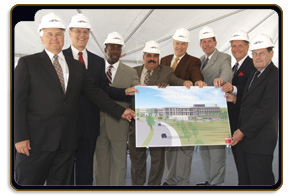Texas Transportation Institute Creates "Campus" with Headquarters and Research Building

Holding the artist's rendition of TTI's State Headquarters and Research Building are (left to right) A&M System Chancellor Michael D. McKinney, Vice Chancellor and Dean of Engineering G. Kemble Bennett, Regent Bill Jones, Texas Department of Transportation Executive Director Amadeo Saenz, TTI Director Dennis Christiansen, TTI Council Chair David Cain, Senior Vice President of Trinity Industries Rex Cottle, and TTI Director Emeritus Herb Richardson.
The Texas Transportation Institute State Headquarters and Research Building is scheduled for completion in November 2009, creating the agency's first "campus-like" environment for TTI researchers and staff. The building is next door to TTI's Gibb Gilchrist Building in Texas A&M University Research Park, where many of the agency's research staff and laboratories have been located for the past decade.
The new three-story, 66,700-square-foot building will house research programs and TTI's administrative offices. Other features include conference and meeting facilities, a courtyard between the buildings with covered walkways and a business center for visiting employees and agency guests. These features will increase the potential for collaborative research opportunities critical to the agency's growth and development. The total project cost is $18.9 million, with $6.9 million generated from PUF bond proceeds.
The Traffic Control Materials Research Facility, to be located on the first floor, features a 125-foot-long corridor. This facility will be used initially to test materials for traffic signs and pavement markings, but also has capabilities to measure vehicle headlamps, sign lighting and roadway lighting. The laboratory's equipment will measure the photometric properties of traffic control devices and lights to ensure safe travel for nighttime drivers. The corridor also includes a waterproof area for erosion and environmental studies. TTI researchers and Texas A&M faculty from a variety of disciplines can use the facility for research in traffic engineering, highway safety, vision sciences, geometric designs, and human factors affecting transportation safety.
In April 2008, friends and supporters from around the state joined TTI employees and leaders from The Texas A&M University System at a construction celebration for the building.
"It is not this building that we celebrate here today, but the work that will be done in this building, the lives that will be saved, the families that will be spared grieving for the loss of a loved one, the product that will be moved, and the jobs that will be created and preserved," Bill Jones, then-chairman of the Texas A&M System Board of Regents, told the crowd.
"TTI has undergone significant growth - not only in traditional research arenas, but in new and expanding areas that barely existed 10 years ago," said Dennis Christiansen, agency director. "Through this new facility, TTI is well-positioned to play a leading role in addressing a wide range of transportation topics and issues for many years to come."
Since 1950, the Texas Transportation Institute has sought solutions to the problems and challenges facing all modes of transportation - surface, air, pipeline, water, and rail. TTI annually works with nearly 200 sponsors at all levels of government and the private sector. At any one time, TTI has research projects in about 30 U.S. states and 20 foreign countries.
In addition to its facilities on the Texas A&M campus, TTI maintains a full-service safety proving ground facility and erosion control laboratory in Bryan, and has offices in Arlington, Austin, Dallas, El Paso, Galveston, Houston, and San Antonio.